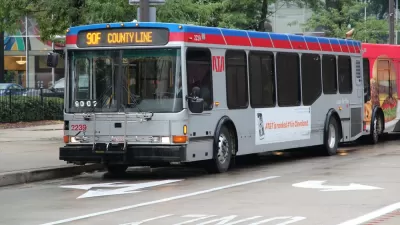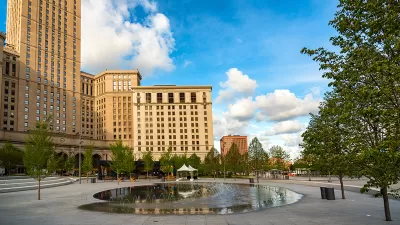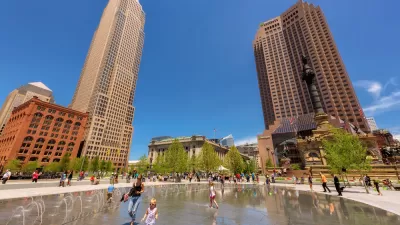A plan to shut down streets around Cleveland's Public Square and make it a pedestrian friendly civic space has prompted many commenters to call for revisions to the plan, especially with regard to the square's heavy bus transit capacity.
"As Cleveland mobilizes to complete a sweeping makeover of Public Square in time for the Republican National Convention in 2016, questions linger over whether bus transit in the 10-acre civic space in the heart of downtown would be negatively affected by the project," reports Joe Litt.
According to Litt's coverage, one key voice in the discussion, CEO and General Manager of the Greater Cleveland Regional Transit Authority (RTA) Joe Calabrese, is reserving final judgment.
At issue is the access of buses to Superior Avenue, which would be the only type of vehicle allowed on the street.
According to Litt, "[a] majority of readers [of The Plain Dealer and Cleveland.com] said they wanted to see buses banished from the square entirely, or at least relegated to the peripheral roads around it." But given that the RTA runs about 4,000 buses through the square daily, the transit agency has reason to be cautious in assessing the impacts of moving transit to other locations.

Planetizen Federal Action Tracker
A weekly monitor of how Trump’s orders and actions are impacting planners and planning in America.

Map: Where Senate Republicans Want to Sell Your Public Lands
For public land advocates, the Senate Republicans’ proposal to sell millions of acres of public land in the West is “the biggest fight of their careers.”

Restaurant Patios Were a Pandemic Win — Why Were They so Hard to Keep?
Social distancing requirements and changes in travel patterns prompted cities to pilot new uses for street and sidewalk space. Then it got complicated.

DC Area County Eliminates Bus Fares
Montgomery County joins a growing trend of making transit free.

Platform Pilsner: Vancouver Transit Agency Releases... a Beer?
TransLink will receive a portion of every sale of the four-pack.

Toronto Weighs Cheaper Transit, Parking Hikes for Major Events
Special event rates would take effect during large festivals, sports games and concerts to ‘discourage driving, manage congestion and free up space for transit.”
Urban Design for Planners 1: Software Tools
This six-course series explores essential urban design concepts using open source software and equips planners with the tools they need to participate fully in the urban design process.
Planning for Universal Design
Learn the tools for implementing Universal Design in planning regulations.
Heyer Gruel & Associates PA
JM Goldson LLC
Custer County Colorado
City of Camden Redevelopment Agency
City of Astoria
Transportation Research & Education Center (TREC) at Portland State University
Camden Redevelopment Agency
City of Claremont
Municipality of Princeton (NJ)





























